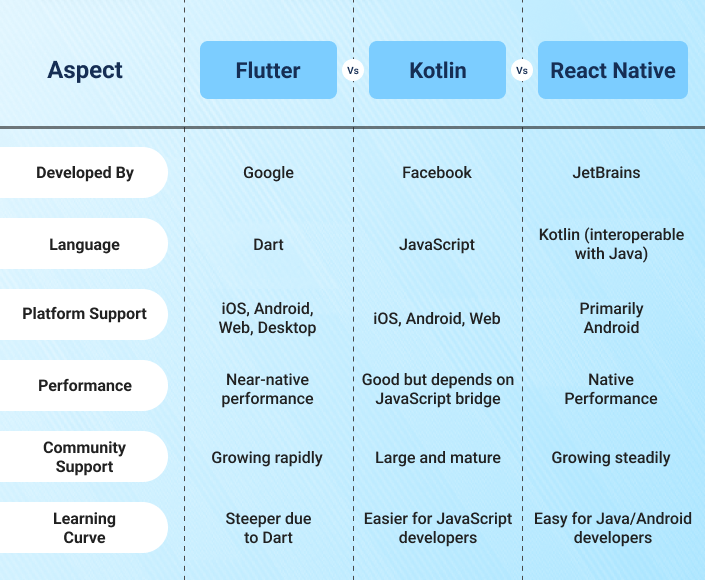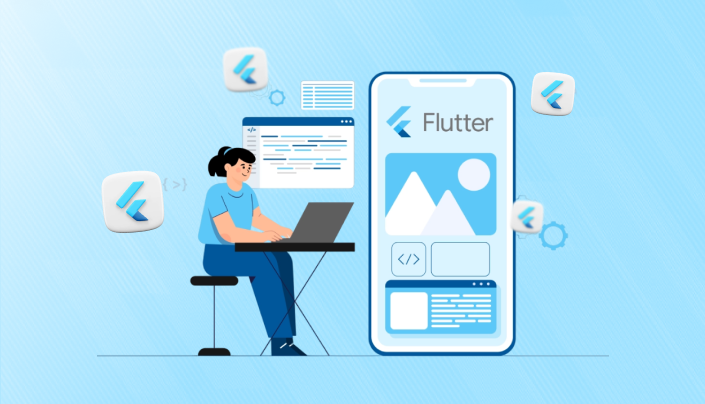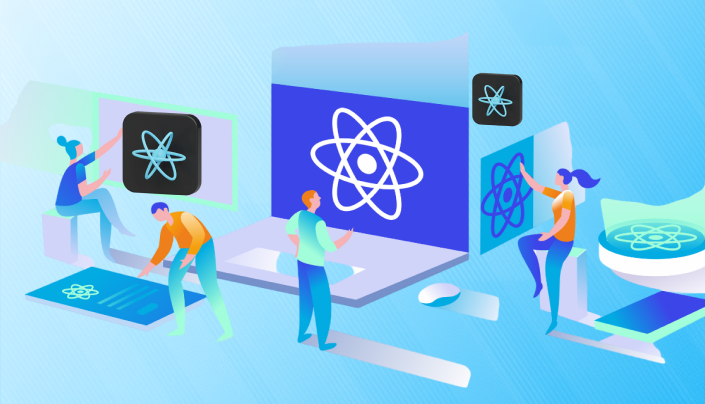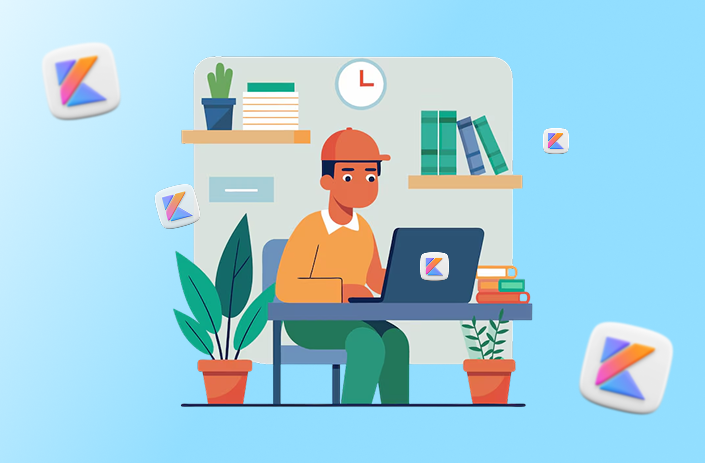Mobile app downloads are set to cross the 150 billion mark in 2025. Are you thinking about making the most out of it? The first thing that you must work on is finding the right framework for robust and scalable mobile applications. Whether you are an enterprise or a startup, choosing right Android app development frameworks is an essential step. If you are looking for one, then you might find it difficult to choose between Flutter, React Native, and Kotlin.
All these frameworks are different yet powerful enough to help you with the top application. To make it easy for you to decide, below we discuss these frameworks in detail to proceed ahead with clarity.
Flutter vs. React Native vs. Kotlin
Before we move ahead with the detailed differences between these frameworks, it is important that you understand about them in brief. Check it out.

Hopefully, you are clear about what separates them in terms of providing app development assistance. But to make decision making easier for you, below we dig in and understand every aspect of the respective frameworks. Read on.
Flutter: Overview
Developers use this open-source UI toolkit to come with web, mobile and desktop applications using a single codebase. So, with the use of Flutter, developers get to complete their tasks quicker using a single codebase. As the framework uses dart programming language and top UI components, you can be certain of getting top-notch quality in a quick span.

Numbers Game:
- Over 2 million developers globally use Flutter.
- Approximately 500,000 Flutter-based apps are published on the Google Play Store.
- Flutter has gained more than 145,000 stars on GitHub.
- Companies like Google, Alibaba, and Tencent are using Flutter for high-performance apps.
Strengths:
- Rich UI Toolkit: Flutter offers customizable widgets that adhere to Material Design and Cupertino standards.
- Hot Reload: Developers can instantly see changes in the code without restarting the application.
- Cross-Platform Development: A single codebase supports multiple platforms.
Challenges:
- Learning Curve: Dart is less common than JavaScript or Kotlin.
- Limited Ecosystem: While growing, its library support is not as extensive as React Native.
Best For: The respective framework can be ideal for the ones who are looking for apps that look stunning. Not only this, you can be certain that having the application with consistent performance across multiple platforms. So, it can be ideal to help your business achieve the set goals.
React Native: Overview
React Native is a popular cross-platform framework developed by Facebook. It enables developers to build apps using JavaScript and React while delivering native-like performance.

Numbers Game:
- As of 2025, approximately 42% of developers worldwide prefer React Native for their needs of cross-platform app development.
- More than 11.9 million websites are using React for UI development.
- Popular apps like Facebook, Instagram, Uber Eats, and Airbnb are using React Native for efficient updates and user experience.
- React Native boasts more than 17,000 contributors globally for regular growth.
Strengths:
- Large Ecosystem: React Native benefits from JavaScript’s vast library ecosystem.
- Faster Development: The use of JavaScript makes it easy for web developers to transition into mobile development.
- Community Support: With years of adoption, React Native boasts a large community and extensive resources.
Challenges:
- Performance Issues: The JavaScript bridge can cause delays in complex applications.
- Native Modules Dependency: Developers often rely on third-party libraries for native features.
Best For: React Native is ideal for startups or businesses seeking rapid development with access to a wide pool of JavaScript developers. A custom software development company can help optimize its potential for your project.
Kotlin: The Native Champion
Kotlin is a statically typed programming language developed by JetBrains and officially supported by Google for Android development. It also powers Kotlin Multiplatform for cross-platform projects.

Numbers Game:
- Kotlin is still the top choice for Android development needs in the year 2025, with the majority of apps developed using this framework.
- Kotlin Multi-Platform helps developers around the world to develop applications across platforms.
- Giants like Google, Netflix, and Pinterest are using Kotlin for both Android and backend development.
Strengths:
- Native Performance: Kotlin compiles directly into native code for seamless integration with Android.
- Interoperability with Java: Developers can use existing Java libraries alongside Kotlin.
- Flexibility: Offers full control over UI design and platform-specific features.
Challenges:
- Limited Cross-Platform Support: While Kotlin Multiplatform exists, it’s still evolving compared to Flutter and React Native.
- Smaller Community: Fewer resources compared to other frameworks.
Best For: If you’re focused solely on Android app development services or need high-performance apps tailored specifically for Android users, Kotlin is an excellent choice.
Key Comparison Factors
Now to make things easier, below are the key factors for you to check with before making any decision.

- Performance
- Because of its Ahead-of-Time (AOT) compilation, Flutter provides almost native performance.
- Complex applications may run more slowly since React Native relies on the JavaScript bridge.
- Since it compiles straight into platform-specific code, Kotlin offers native performance.
2. Development Speed
- Flutter’s hot reload function accelerates UI testing and iterations.
- Its well-known JavaScript syntax lets React Native enable fast prototyping.
- Although it may take longer, Kotlin’s native approach guarantees strong outcomes.
3. Community & Support
- Among the three frameworks, React Native boasts the biggest community.
- With significant Google backing, Flutter’s community is expanding quickly.
- Its inclusion with Android Studio means Kotlin has a smaller yet passionate community.
Choosing the Right Framework
Now when you have complete clarity about the frameworks, it is important that you understand the attributes that can help you choose one. So, below we will give you some of the essential options to consider.
Option 1: If the priority is a visually stunning application, make sure to hire Android app developers who have the expertise of working in Flutter platform.
Option 2: Now if you are getting the application with timeline as concern, then you must go for Javascript developers with react native know-how.
Option 3: You must consider opting for Kotlin if you are focusing more on native Android app development services. It will help you with better performance and flexibility.
Why Work With Experts?
Whether you are choosing Flutter, React Native, or Kotlin, it is important that you connect with the best custom software development company. The experts here will understand the different aspects of the frameworks and make it easy for you to proceed ahead with clarity. With the help of the experts, you get the services covered as per your business needs. In fact, the experts ensure that you get the delivery without compromising the scalability and performance of the application.
Final Take
All the frameworks, including Flutter, React Native, and Kotlin, come with their own set of pros and cons. It is important that you understand the project goals, audience and the budget issues before choosing the framework. If you are able to understand these aspects, you can hire mobile app developers to assist you in making the right decision that can help you achieve success in this competitive market.
We at LL Techolab are here to help you in choosing the right app development framework for your next assignment and ensure all the boxes are ticked. Consult now!







